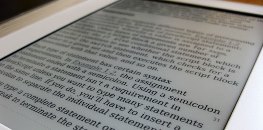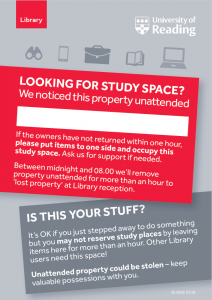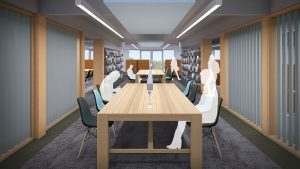
Are all the print copies of the book you need to read out on loan? Have you reached the limit on the number of books you can borrow at any one time from the Library but you still need to read more? Is it cold and raining and you just don’t want to leave your room? No problem – the Library may have an e-book! E-books are available to you 24/7 from any device which is connected to the internet so are great when you’re off-campus. If you haven’t used e-books before, or want to make sure you’re getting the best experience, have a look at our LibGuide on e-books.
Finding e-books
You can find e-books using either Enterprise or Summon. Enter your search terms into the search box, then refine your results. On Enterprise you will need to choose the Online and Book filters on the left-hand side; on Summon you can select the Publication Type E-book from the filters on the left-hand side. See the Library’s guide on Summon for tips on how to make your results even more specific to what you need.
Accessing e-books
It’s important to know that our e-books are not all available on the same platform. Take a look at the Library’s page on e-books for a list of the different available platforms and more information on what they will let you do.
 Although all our e-books can be accessed from any device with an internet connection, most e-book platforms do not automatically re-format the size of the text to fit your device. For the best viewing experience we would recommend accessing our e-books from a PC or laptop computer.
Although all our e-books can be accessed from any device with an internet connection, most e-book platforms do not automatically re-format the size of the text to fit your device. For the best viewing experience we would recommend accessing our e-books from a PC or laptop computer.
Most of our e-books use online e-reader software which is integrated into the platform, so you should not need to download any additional software. For some e-books you will need to download the relevant chapters in PDF format to view them. You will need Adobe Acrobat to read these.
Some of our e-books can be downloaded in full, but you may be prompted to install Adobe Digital Editions software to view them on your device. This software is different to Adobe Acrobat.
How can e-books help you to study smarter?
E-books have features which you can use to help you in your studies. For instance, you can search the text electronically to find key words or phrases. You can easily print off specific pages from most e-books, saving you the trouble of photocopying (though remember that rules about Copyright and the amount you can copy still apply). You can also annotate the e-book, writing your own notes which you can print or export. Don’t try doing this on a paper Library book!
If you’re using reference management software like EndNote, you may be able to directly export the details you will need for your citations. Do remember to use details for the e-book version, as page numbers may not be the same as in the print version. For more information on referencing, see our Citing References guide, or the Academic Integrity Toolkit.
 Why can’t I access this e-book?
Why can’t I access this e-book?
Some platforms, such as MyiLibrary and EBSCOhost only allow an e-book to be viewed by one or sometimes three people at a time. If you get a message saying the e-book is already in use, take a quick break and try accessing it again after a few minutes.
Any problems?
If you’d like more help on how to find and use e-books effectively, get in touch with your Liaison Librarian. If you’re experiencing technical difficulties accessing e-books, please contact the E-resources Team via the Problem Report Form.
This is one of a series of tips to help save you time and effort finding or using information.
This tip was written by Rachael Scott, Content Manager and Kim Shahabudin, Study Adviser.
 The Library has recently taken the difficult decision to cancel our subscription to IEEE Xplore. Since April 2017 we have been in discussions with IEEE and their UK agents over a new 3-year deal for IEEE Xplore Digital Library. In spite of the fact that the University no longer has a School of Systems Engineering, and usage of the resource has been reducing for several years, the proposed pricing from IEEE was unacceptable, and indeed represented an increase on what we had previously paid. There is no transparent pricing system for this resource, and no significant reductions in price were offered. We would have liked to continue the subscription, but unfortunately had reached a point where a resource represents such poor value for money that cancelling it becomes necessary.
The Library has recently taken the difficult decision to cancel our subscription to IEEE Xplore. Since April 2017 we have been in discussions with IEEE and their UK agents over a new 3-year deal for IEEE Xplore Digital Library. In spite of the fact that the University no longer has a School of Systems Engineering, and usage of the resource has been reducing for several years, the proposed pricing from IEEE was unacceptable, and indeed represented an increase on what we had previously paid. There is no transparent pricing system for this resource, and no significant reductions in price were offered. We would have liked to continue the subscription, but unfortunately had reached a point where a resource represents such poor value for money that cancelling it becomes necessary.


 Although all our e-books can be accessed from any device with an internet connection, most e-book platforms do not automatically re-format the size of the text to fit your device. For the best viewing experience we would recommend accessing our e-books from a PC or laptop computer.
Although all our e-books can be accessed from any device with an internet connection, most e-book platforms do not automatically re-format the size of the text to fit your device. For the best viewing experience we would recommend accessing our e-books from a PC or laptop computer. Why can’t I access this e-book?
Why can’t I access this e-book? Where do I find my subject guide?
Where do I find my subject guide?
 Contact us!
Contact us! Starting this Friday (17 November), students will be able to make use of
Starting this Friday (17 November), students will be able to make use of  Work has begun on the installation of the cladding towards the front of the University Library. Over the next weeks, the contractors will be installing cladding brackets and rails on the exterior walls, which will involve heavy drilling. Occupants of Edith Morley, Whiteknights House and URS buildings may experience a higher than usual noise level, but are advised that the noisiest drilling work will finish by 10:00 every day.
Work has begun on the installation of the cladding towards the front of the University Library. Over the next weeks, the contractors will be installing cladding brackets and rails on the exterior walls, which will involve heavy drilling. Occupants of Edith Morley, Whiteknights House and URS buildings may experience a higher than usual noise level, but are advised that the noisiest drilling work will finish by 10:00 every day. marked down for incomplete or inconsistent references? There are some online tools that can help!
marked down for incomplete or inconsistent references? There are some online tools that can help!


 your clutter folder, so please be vigilant.
your clutter folder, so please be vigilant. Please help us share study space in the URS building fairly. It is fine to pop over to the Library building for a book and return to your desk within a short time. However, we think it unfair for students to reserve desks with their belongings for long periods when other students want to use that space.
Please help us share study space in the URS building fairly. It is fine to pop over to the Library building for a book and return to your desk within a short time. However, we think it unfair for students to reserve desks with their belongings for long periods when other students want to use that space.
